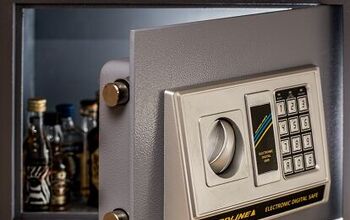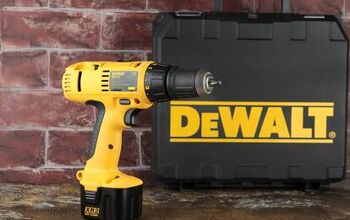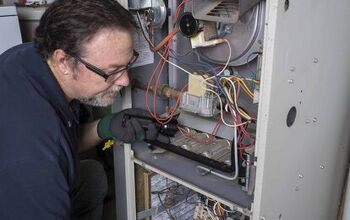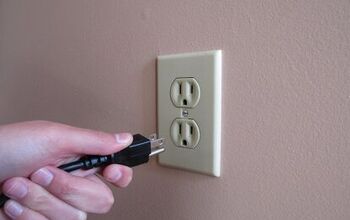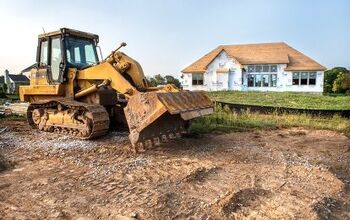AC Unit Fan Is Not Spinning And Is Hot? (Fix It Now!)

A properly functioning AC unit is a must in sweltering hot summers. It’s easy to panic if you notice your air conditioner isn’t working correctly. One common problem is an AC unit with a fan that is not spinning and that is hot.
If the fan on your AC unit isn’t spinning, there could be a problem with the capacitor and/or motor. There could also be a faulty compressor contractor or a lack of power. If you hear buzzing and the fan isn’t spinning, there may be a capacitor problem. If the motor is hot, there may be a problem with the capacitor or centrifugal switch.
To get your AC unit back to normal and breathe easy in a beautifully cool home again, you will need to get a better idea of what might be causing the problem.
Do You Need Central A/C Service or Repair?
Get free, zero-commitment quotes from pro contractors near you.

Why is the Fan on My Outdoor AC Unit Not Spinning?
There are some common problems that can make the fan on your outdoor AC unit stop spinning. If the compressor seems to be working but the fan isn’t spinning, there is probably an issue with the capacitor and/or motor. If you cannot hear any noise coming from the machine, the compressor probably isn’t working. If the fan isn’t spinning as well, there is probably a faulty compressor contractor or a problem with the power supply.
Dead Capacitor
One of the most common reasons that AC unit fans stop spinning is due to a dead or faulty capacitor. Your AC’s capacitors are small, cylindrical components that are responsible for sending energy signals to power the fan motor and the rest of the unit. Air conditioning systems have numerous types of capacitors, including the start capacitor and the run capacitor. Over time, capacitors can go bad and need replacing.
Signs of a Bad Capacitor
If you think your capacitor might be the problem, there are some signs to look out for. One of the most common signs of a bad capacitor is if your air conditioner won’t turn on. If there isn’t a burned-out motor or a wire disconnect, the capacitor could be the problem.
Another sign that you might have a bad capacitor is if the air conditioner has delayed reactions. If you change a setting and have to wait a couple of minutes for the new setting to activate, this might be the reason. A third sign is if your air conditioner is having difficulty staying on. If your capacitor is having difficulty, the air conditioner will likely turn off randomly.
There may also notice a burning smell coming from your air conditioner. This will happen if the capacitor recently blew out or failed. You may have also heard a soft popping noise and there could even be some smoke coming from the unit. If your air conditioner isn’t producing cold air, that can also be a sign of a bad capacitor.
Yet another potential sign of a bad capacitor is increasing energy bills. If you are sure you’ve been using the air conditioner in the same way as you did before and your bills have increased with no good explanation, it could be a result of the capacitor. If you have a bad capacitor, you will need to replace it. Luckily, capacitors are affordable.
Troubleshoot a Faulty Capacitor
There is a way to test the capacitor attached to your fan. Before you begin this process, remember never to use any sort of conductive material or metal when doing this. That could be very dangerous. You should only use a wooden stick.
Step 1. Get the right kind of wooden stick. Find a thin, long wooden stick.
Step 2. Put this wooden stick gently into the fan grate. Gently push the wooden stick through the air conditioner’s fan grate.
Step 3. Use the wooden stick to push a blade. Put gentle pressure on one of the blades. You are doing this to try to make the fan spin. Never get your fingers anywhere near the grate. This could be dangerous.
Step 4. Check to see if the fan starts spinning. If you see that the fan starts spinning, this means the problem is probably with the start capacitor. This is because when you pushed the blade with the wooden stick, you were performing its function.
An easier way of checking your capacitor is to use a voltmeter. If you test your air conditioner with a voltmeter and it shows no voltage, this means that you will need a new capacitor.
Weak Air Conditioner Flow
Is the fan working but you notice that your air conditioner has weak airflow? The problem is probably a clogged air filter. Other potential reasons for the problem are blocked air ducts, a faulty AC blower, or a frozen evaporator. Also, the condenser unit might be blocked or there could be thermostat issues.
A problem with the capacitor can cause a poorly functioning fan. Weak air conditioner flow can also be caused by a bad capacitor or a capacitor that will soon burn out.
Why is My AC Unit Fan Hot?
The condenser fan is needed for the fan blades to turn and for air to move across the condenser coil. This is key for cooling the refrigerant, which is necessary for it to become a liquid solution. When the condenser fan isn’t working as it should, your air conditioner won’t be able to function. If the condenser fan isn’t working correctly, the top of your AC unit will be very hot. If you touch the top of your unit and notice it is hot, there is a strong chance your condenser fan isn’t working properly. If you think this might be the case, contact a professional AC repair company.
When the motor is hot, there could be a problem with the capacitor or centrifugal switch. Problems with the centrifugal switch or capacitor can usually be repaired for a small fee. If there are damaged windings, this will usually mean you need to replace the machine.
Other potential reasons that your AC fan motor is overheating is that the motor is simply worn out. Old motors will eventually give out due to lack of maintenance or excessive use. It’s also possible that debris is stuck inside the unit or there is overgrown vegetation restricting airflow.
Overall, without regular maintenance done by a professional, your AC unit fan motor will wear out quicker than it should.
Signs of Overheating
Condenser fan motors will start to overheat when the hit a temperature of about 150 degrees Fahrenheit. When they overheat, the motor will stop, also stopping the HVAC system and potentially resulting in damage to other crucial components. That said, here are the most telltale signs that your condenser fan could be overheating:
- A humming or buzzing noise coming from the outdoor AC unit, which usually indicates a bad capacitor.
- The top of the AC unit is hot to the touch.
- There is a strong odor coming from the outdoor unit.
- The system is no longer emanating cold air.
- The system suddenly shuts off.
If your HVAC system is showing any of the aforementioned signs of overheating, you should contact a professional immediately.
Related Questions
How much does a new AC capacitor cost?
Many homeowners are able to replace their capacitors by themselves. Capacitors for AC units often cost between just $12 and $35. If you feel more comfortable getting a professional to do the replacement, it will probably cost you between $50 and $100. There may also be a diagnostic fee, as the professional will want to ensure that the capacitor is indeed the problem.
Why does my floor fan motor get hot?
There are two main reasons why a floor fan motor might get hot. One reason is dirty fan bushings. When these get dirty, they can make it harder for your fan blades to move. The bushings will get hotter as a result. The fan’s motor will also get hotter. Another potential cause of your floor fan motor getting hot is shorted motor windings. When motor windings are shorted, the fan’s motor will start to draw more current.In most cases, you should get a repair professional to fix your fan. You can try to clean the motor and the bushings yourself. However, always read the manual before you attempt any kind of repair.

We are a team of passionate homeowners, home improvement pros, and DIY enthusiasts who enjoy sharing home improvement, housekeeping, decorating, and more with other homeowners! Whether you're looking for a step-by-step guide on fixing an appliance or the cost of installing a fence, we've here to help.
More by Upgraded Home Team










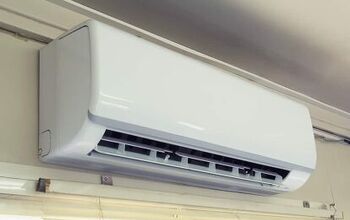

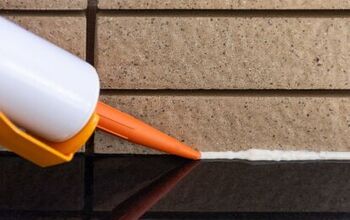
![10 Best Electric Lawn Mowers - [2022 Reviews & Top Rated Models]](https://cdn-fastly.upgradedhome.com/media/2023/07/31/9070486/10-best-electric-lawn-mowers-2022-reviews-top-rated-models.jpg?size=350x220)

